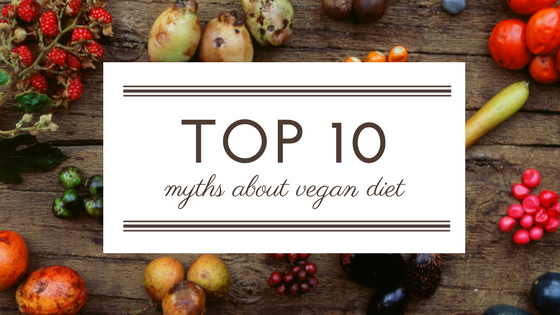 )
)
While vegan diets are gaining status more quickly than anyone could ever have imagined, they still sit well outside the mainstream. We have a big challenge in getting the message out that this way of eating is not only safe and healthful, but enjoyable and realistic too.
At the same time, an enthusiasm for vegan eating among its proponents has given rise to unfortunate myths that cause some vegans to make poor food choices.
We’re going to do some myth-busting, and here are ten of the biggest ones that we’ll tackle:
reference: Vegan for life-healthy and fit on a plant based-diet.

1. Vegans need less calcium than omnivores.
While we may not know exactly how much calcium we need, there is currently no good evidence to suggest that vegans require less than anyone else. This is another situation where basing recommendations on outdated science and wishful thinking just isn’t fair to vegans.
2. To reap the health benefits of a vegan diet, you need to avoid fat.
The idea that we need to avoid all dietary fats, including healthful plant ones, is outdated and perhaps even harmful. But even if eating a very low-fat diet is perfectly safe, there is no evidence that it has any advantages over a diet that includes some fat-rich plant foods. Foods like avocado, nuts and nut butters, olives, tofu, dressings and sauces add interest and variety to vegan diets.
3. The healthiest vegan diets are based on 100 percent unprocessed
whole foods.

Not all vegetarian or vegan foods are healthy or created equal. In fact, many can be filled with processed fillers, preservatives, and “bad” fats that have a shelf-life to last a century.
4. People don’t need to start taking vitamin B12 supplements until they
have been vegan for three years.
From the day you go vegan, you should begin to supplement with vitamin B12 or use a variety of fortified foods.
5. If a vegan diet is good, then a raw-foods diet must be better.
I see a lot of good intention in people following a raw food diet and I understand why they want to change today’s dietary habits, but I think that jumping to the other extreme is not everyone's cup of tea.
6. Eating soy gives men female characteristics.
Soy contains a variety of chemicals, including phytoestrogens, or “plant estrogens.” The link between gynecomastia (enlarged breasts in men) and soy proteins has yet to be fully established and the two cannot be linked without further human studies.
7. When you first go vegan, you’ll experience unpleasant feelings from detoxing and withdrawal from animal products.

I think the experience is just going to be different for everyone, mostly because we all come to a plant-based lifestyle from a different place. What might be a small change for one person could be a huge change for someone else.
8. Vegan teens are at risk for developing eating disorders.
Not every single child following a vegan diet is on the fast track to an eating disorder! It is a tricky area, and is a discussion prone to tumultuous argument. The general population can deal with food restriction, and someone without a genetic predisposition can do quite nicely on a vegan or any other diet. But, for a person affected by an eating disorder, food restriction can be miserably obsessive at best, and deadly at worst.
9. Plant proteins are missing some essential amino acids.
The 4 essential amino acids missing from most plant foods are lysine, tryptophan, methionine, and phenylalanine. However, you can get all of them from vegetarian sources.
Lysine: Found in quinoa, black beans, garbanzo beans, yeast, lentils, kidney beans, wheat germ, pistachios, spirulina, soy products, (like tempeh), and fenugreek seed.
Tryptophan: Found in spinach, asparagus, nuts (especially almonds), peanuts, peanut butter, soy, wheat germ, sesame seeds, and pumpkin seeds.
Methionine: Found in avocado, wheat germ, sunflower seed butter, brazil nuts, oats, and oatmeal.
Phenylalanine: Found in lima beans, nuts, peanuts, pumpkin seeds, sesame seeds, whole grains, soybeans, pecans, chickpeas, and lentils.

10. Vegans need to consume only 5 to 6 percent of their calories as protein
To meet protein recommendations, the typical moderately active adult male vegan needs only 2.2 to 2.6 grams of protein per 100 calories and the typical moderately active adult female vegan needs only 2.3 to 2.8 grams of protein per 100 calories. These recommendations can be easily met from vegan sources.
Hi ! we really like your post, actually we are vegetarian and we are thinking about trying to be vegan haha thanks for sharing ;) pass by and read our posts if you are interested :D
Downvoting a post can decrease pending rewards and make it less visible. Common reasons:
Submit
Hey, thanks guys! The transition does become easier if you are already vegetarian, so do give it a try for at least a week and see :)
Downvoting a post can decrease pending rewards and make it less visible. Common reasons:
Submit